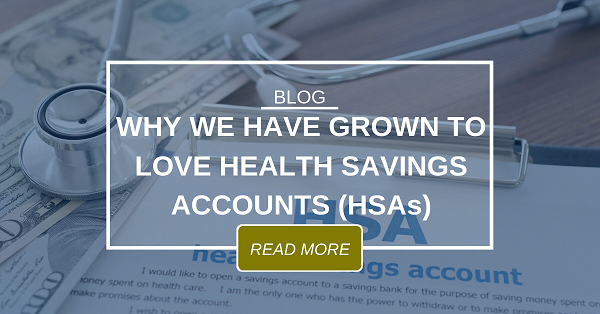Why We Have Grown to Love Health Savings Accounts (HSAs)
By now, most of us have at least heard of Health Savings Accounts (HSAs) and many of us have an account. HSAs were created in 2003 so that individuals covered by high-deductible health plans could receive tax-preferred treatment of money saved for medical expenses. Generally, an adult who is covered by a high-deductible health plan may establish a HSA.
When HSAs were first established, individuals were reluctant to contribute. For one thing, a HSA meant you had to have a high deductible health plan (HDHP). Who wanted to have a higher deductible? Back in 2003, many people were still accustomed to relatively affordable health insurance coverage that covered, well, pretty much everything. Maybe you had a $15 co-pay, but certainly not thousands of dollars of deductibles. Those were the days. So, electing a high deductible plan seemed risky. We also didn’t know what we could use the money for and how difficult it would be to get it out. We had tried the flexible spending accounts (FSAs) where you were rushing to Walgreens on December 31st to buy $575 worth of contact solution just so you didn’t lose out on the amount you had saved throughout the year. We didn’t understand it, it seemed risky, and frankly, it was just too much work.
Then came the wave of increasing health insurance premiums and deductibles. Employers were giving us a choice between a traditional health care plan with a lower deductible and a HDHP that offered lower premiums. The lower premiums were intriguing. We decided that we’d probably come out ahead if we went with the HDHP. Many employers were also offering to contribute to a HSA on our behalf. Accounts became easier to open and they were funded directly through our employers. And, (my favorite part), they came with a debit card that could be used to pay my medical bills. No saving receipts and no having to submit for reimbursement.
I didn’t even mention the best part: 1. Any contribution you make to a HSA is deductible from your federal and state taxes (up to the contribution limit), and 2. Even if you don’t use all of your annual contribution, those dollars can stay in the account and fund future health care expenses. Many HSAs even have an investment component where you can invest a portion of your account in mutual funds, which means your account can grow even larger years from now. Oh, and once you are 65, you can take withdrawals from a HSA without penalty for non-health related expenses. Note: You’ll still owe ordinary income taxes on these withdrawals.
As financial advisors, we love the idea of you having a separate account for health care expenses. If you save the maximum amount each year (over the past 10 years, the contribution limit for a HSA account has gone from $5800 to $7000 for family coverage ), and get just a modest return, you can have a nice balance built up by the time you retire.
So, we’ve convinced you to consider a HSA. What exactly can you pay for with your HSA account? There are many items that you can pay for with your HSA account, but examples include:
- Medical expenses that are not covered by your health insurance, but are applied to your annual deductible.
- COBRA premiums (Note: Health insurance premiums are generally not a qualified expense, but COBRA is an exception).
- Dental and orthodontic work (THANK YOU x 3!)
- Contacts, glasses
Ok, but I’m now retired and on Medicare and a Supplemental plan. Almost all of my health care expenses are covered. What will I ever use my HSA balance for? We’ve got you covered:
- Dental Treatment (think crowns, implants, etc)
- Hearing Aids
- Contact Lenses and glasses
- Medicare Part B and D premiums – NOT Medicare Supplemental Insurance
- Qualified Long-Term Care Services
- Chiropractor
- Medicine that requires a prescription
- Insulin
- And remember, even if you happen to NOT need the balance for health related expenses (fingers crossed!!!), you can take withdrawals from the account without penalty once you are 65. Sure, you’ll have to pay income taxes on the withdrawals, but you received the deduction when you made the contribution and had years of tax free growth, so that seems fair and still a good deal.
Long story short, if you’re under 65, we’d encourage you to consider if a high deductible health plan makes sense for your family. If so, contribute as much as possible to a HSA account. Before you make a distribution from your account, refer to IRS pulication 502 https://www.irs.gov/publications/p502#en_US_2018_publink1000178923 to make sure it is a qualified expense. I promise, it’s actually pretty easy to read!
